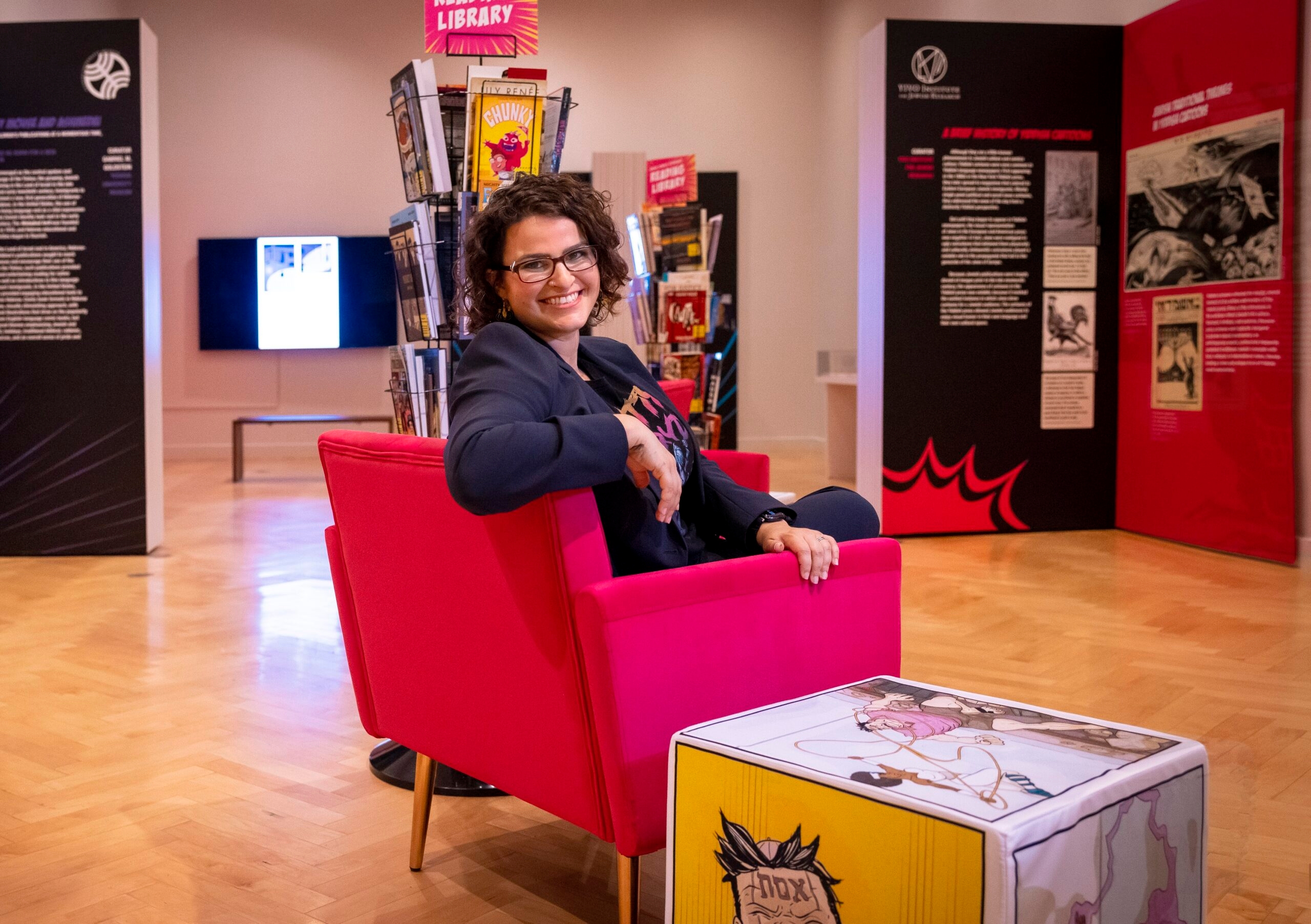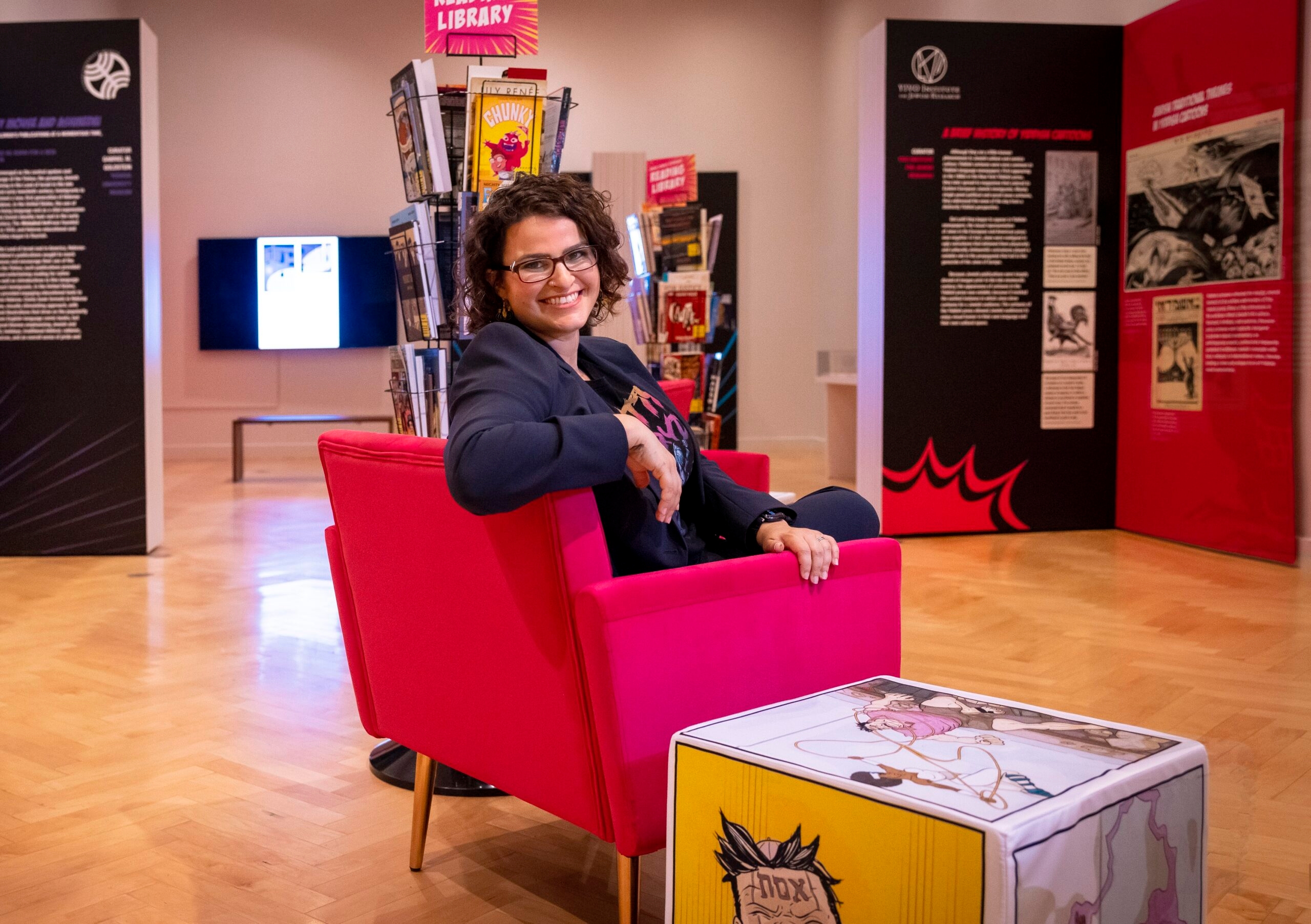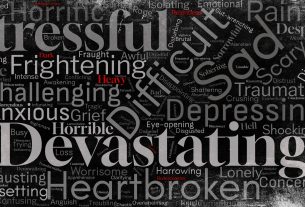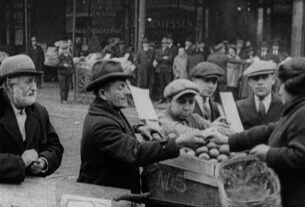(New York Jewish Week) — More than 400 comic book lovers flocked to Manhattan’s Center for Jewish History on Sunday for the first-ever Jewish Comics Experience, a pop culture convention that was billed as the “ultimate comics and pop culture event.”
Some 35 comics creators participated in the inaugural JewCE, including “Sin City” creator Frank Miller and underground comics legend Barbara “Willy” Mendes. Others participating were artists who specialize in depicting Torah stories, creators of Jewish superheroes, autobiographical writers who just happen to be Jewish and non-Jewish authors and artists who create Jewish content.
“It’s high time that Jewish creators are recognized for their contribution to comic culture, a culture that was for the most part created by Jewish people,” JewCE co-founder Fabrice Sapolsky told the New York Jewish Week.
Though the event was planned long before Hamas’ Oct. 7 attack on Israel and the subsequent war, the continued violence in the Middle East and its reverberating effects was resonant across the convention. In myriad panel conversations and in one-on-one discussions, the situation in Israel, increased antisemitism across the globe and the acute need for Jewish joy were frequent themes. For many creators and attendees, “showing up” and supporting the Jewish community was at the top of mind, while others noted the camaraderie among individuals who all shared a a love of Jewish culture.
According to Miriam Mora, the co-founder of JewCE and the director of programming at the Center for Jewish History, the difficult moment made a Jewish comic convention more relevant than ever. “Comics are worth paying attention to because there’s no better way to lift up our community and to fight antisemitism than to educate people about Jewish contributions, Jewish identities, Jewish stories than to celebrate them,” she said.
Indie “comix” icon Mendes, best known for the classic comic “It Ain’t Me, Babe,” agreed. “We just need people to know how wonderful we are because there’s a lot of propaganda out there that we’re terrible,” she told the New York Jewish Week. “We need to counteract that with proof that Jews are wonderful, and that’s what this is all about — and that’s why I’m so happy to be part of the convention.”
The history of Jews and comics is a long and rich one, beginning with the earliest comic book creators — nearly all Jews — to the continued presence of Jewish stories in both popular comics and more esoteric ones. For example, Marvel briefly had a Jewish Black Panther character, while, more recently, author Yehudi Mercato drew upon his Mexican-Jewish family for his middle-grade graphic memoir, “Chunky.” Meanwhile, some traditional Jewish texts have gotten the graphic novel treatment, including Mendes’ recent takes on the weekly Torah portion.
Indie comics icon Barbara “Willy” Mendes poses in front of her mural depicting Torah portions. (Elizabeth Karpen)
JewCE was created to spotlight this rich, diverse history, and the convention was born out of smaller Jewish comic cons that Sapolsky had organized in 2016 and 2018 at Congregation Kol Israel in Crown Heights, Brooklyn. In 2022, Mora reached out to Sapolsky to propose the idea of a larger Jewish comic con at the Center for Jewish History. A lifelong comic book fan herself, Mora thought the center, with its central location near Union Square, was the perfect locale.
“I always regretted that I couldn’t do more Jewish comic cons and Miriam said the magic words. She said ‘let’s be creative,’” Sapolsky told New York Jewish Week.
That creativity was on full display Sunday as creators spoke at panels such as “Jewish Folklore in Comics,” “Queering Jewish Comics” and “Getting Past Ashkenormativity and Secularism in Comics.” Jewish publishers sold a variety of books and individual creators signed their work and mingled with fans. One table was run by the mother of a writer of a Holocaust education comic who couldn’t make the trip from Los Angeles.
Miriam Libicki, an artist and author, traveled many hours from her home in Vancouver to attend the inaugural event. “I knew I really would love to be part of this new con starting up,” Libicki, the author of “But I Live: Three Stories of Child Survivors of the Holocaust,” told the New York Jewish Week. “All the creators are so many people that I’m huge fans of, or colleagues and just Jews in comics who have found each other.”
For some attendees, JewCE was their entry into the world of Jewish comics.
Support the New York Jewish Week
Our nonprofit newsroom depends on readers like you. Make a donation now to support independent Jewish journalism in New York.
Friends Tracy Weiss and Chavi Kahn had planned to see the Yeshiva University Museum exhibit “The Golden Path: Maimonides Across Eight Centuries” at the center when they discovered it closed for convention day. So instead, they attended JewCE, describing it as “completely out of our comfort zones.” And yet, they were surprised at how much they learned about the Jewish origins of the comic industry.
“You could really see the theme of trying to rise above our enemies and challenges,” Kahn said. “And I think it’s particularly resonant in this moment when there are so many challenges, and the depth of this expression is really impressive.”
In addition to the convention, a concurrent exhibit at the Center for Jewish History, “The Museum and Laboratory of the Jewish Comics Experience,” will be on view through the end of the year. Curated by Mora, the “museum” portion of the exhibit consists of five mini exhibits from the five partner organizations that make up the CJH. The Leo Baeck Institute, for example, has an exhibit on how superheroes fought fascism, while the YIVO Institute for Jewish Research’s exhibit is about Yiddish cartoons — as well as a reading library made up of hundreds of Jewish comics.
The laboratory, meanwhile, is an interactive, kid-friendly exhibit that allows museum-goers to try their hand at drawing comics and even dress up to become the Jewish superhero they’ve always dreamed of.

Miriam Mora, co-founder of JewCE and the director of programming at the Center for Jewish History, inside the concurrent exhibit The Museum and Laboratory of the Jewish Comics Experience. (Courtesy the Center for Jewish History)
A preview event on Saturday evening included the first-ever JewCie Awards, designed to highlight excellence in Jewish comics. Awards were handed out to numerous creatives for categories like best diverse representation, best historical narrative and best autobiographical comic. Among the winners were Neil Kleid, Asaf Hanuka and Dani Kolman, while famed satirist and Pulitzer Prize-winner Jules Feiffer and Eisner-nominated author Trina Robbins won the respective Macher and Macherke Awards for their lifetime contributions to comics.
Chari Pere, who was nominated as Artist of the Year, told the New York Jewish Week on Sunday that she relished the opportunity to connect with Jewish peers and to find new audiences for her work.
“This is something that people were hoping about for years,” Pere said of the Jewish con. “As a Jewish cartoonist, what could be better to be among your peers and to be able to have your Hebrew-themed illustrations and ‘Shabbos Tales’ comics featured in an environment where people know what that means?”
Artist and comedian Danielle Brody began drawing cartoons during the pandemic, and only recently became a comics creator, publishing the “Don’t Fuhaggadahboudit” Haggadah in the spring and the soon-to-be-released “Hot Hanukkah Book.”
She said she loved basking in the overwhelming Jewishness that surrounded the convention. “Sometimes when you’re a creator, it feels like sometimes you’re the only person doing something and it can get lonely,” she said. “So to be in a space where everyone’s a Jewish creator, and is channeling their Judaism into art and comics and telling stories, is everything.”
Chicago-based writer Paul Axel, author of “Rotten Roots,” emphasized that it was empowering to be in a space where participants shared both a love of comics and a love of Judaism — and how it was incredibly important to keep pushing for Jewish spaces in the comics industry.
“When you go to a comic con, everybody’s a comic book fan — everyone loves some aspect of that,” he said. “To have a second layer, a deeper layer of the shared culture and ethnicity and identity and religion adds so much more to the show.”
Sapolsky said that JewCE’s first run in New York City is far from its last. The exhibit will run through the end of 2023 and those it are already in talks to take the exhibit to other cities
Support the New York Jewish Week
Our nonprofit newsroom depends on readers like you. Make a donation now to support independent Jewish journalism in New York.
“For us, creating JewCE is not the end of the journey, it’s the beginning of the journey,” Sapolsky said. “We’re ready to think that this event is bigger than any of us. It’s something that has to count because Jews do count, but on top of counting, it’s also important for non-Jews to discover who we are.”




